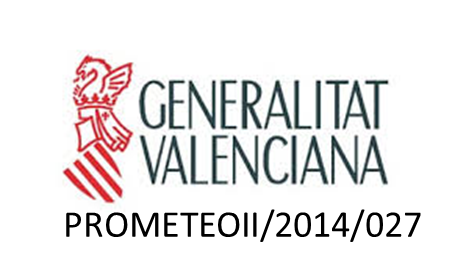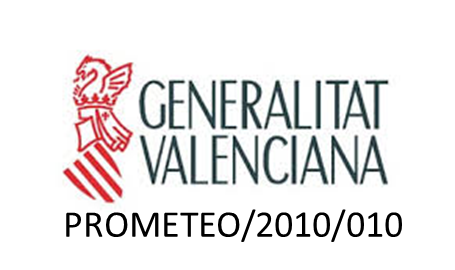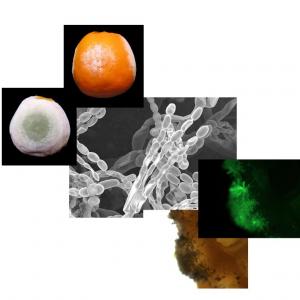
Biography
Most of my scientific work can be grouped into two major themes: Biotechnology of microorganisms related to the agrifood sector and plant pathology. The first line started during my PhD Thesis, which focused on cloning and characterization of two genes of Bacillus polymyxa encoding beta-glucosidases. This work formed part of a strategy for the production of plant cell wall degrading enzymes. This wide group of enzymes was the connection that led to my interest in plant pathology. Thus, the theme during my postdoctoral work was the molecular study of Fusarium solani pectate lyases and their possible role as virulence factors. After my return to the IATA I continued the work towards the use of microbial proteins with potential agrifood interest by cloning, characterization and heterologous expression of the corresponding genes in industrial strains of Saccharomyces cerevisiae or in filamentous fungi. In most cases I worked with genes/proteins involved in the degradation of the plant cell walls. Once I joined the Postharvest group at the IATA most of my work has focused on the study of the fruit-pathogen interaction. From the point of view of the fruit I have worked in the biochemical, molecular, metabolomic and genomic characterization of defense responses and induction of resistance of apple and citrus fruits against their main pathogens (Penicillium expansum and Penicillium digitatum, respectively). These studies have highlighted the secondary metabolism of fruits as one of the key factors in the defense response to infection. On the pathogen side, the group that I lead it has developed a complete set of tools that allow us to dissect the factors of pathogenicity and virulence of the main fruit postharvest pathogenic fungi of the genus Penicillium. Among these factors I would highlight several large groups of genes related to proteolysis, redox metabolism, degradation of plant cell wall, secondary metabolism or effectors. The functional characterization of these genes is now one of the most active lines of our work. A distinctive aspect of the postharvest pathology studies carried out is the use of "omics" approaches, such as metabolomic analysis by HPLC-MS, transcriptomic approaches including cDNA microarrays, subtractive libraries or the use of RNA-Seq to identify induced/repressed genes during the fungus-fruit interaction. In this regard it is noteworthy that we have been pioneers in the sequencing of the genomes of several postharvest pathogenic fungi of the genus Penicillium. Part of our work has a more applied vision, as it focuses on the research and development of alternative methods to chemical fungicides. A parallel line in which I am involved, is the molecular characterization of Aspergillus carbonarius genes involved in the synthesis of the mycotoxin OTA.
Projects











Publications
Sánchez-Torres, P., González-Candelas, L., Ballester, A.R., 2024. Discovery and Transcriptional Profiling of Penicillium digitatum Genes That Could Promote Fungal Virulence during Citrus Fruit Infection. Journal of Fungi 10, 235. https://doi.org/10.3390/jof10040235
Llobregat, B., González-Candelas, L., Ballester, A.-R., 2024. Exploring the Biocontrol Capability of Non-Mycotoxigenic Strains of Penicillium expansum. Toxins 16, 52. https://doi.org/10.3390/toxins16010052
Lafuente, M.T., González-Candelas, L., 2024. Phytohormones in the Penicillium digitatum-citrus fruit interaction. Postharvest Biology and Technology 209, 112704. https://doi.org/10.1016/j.postharvbio.2023.112704
Lafuente, M.T., González-Candelas, L., 2022. The Role of ABA in the Interaction between Citrus Fruit and Penicillium digitatum. International Journal of Molecular Sciences 23, 15796. https://doi.org/10.3390/ijms232415796
Llobregat, B.; González-Candelas, L.; Ballester, A.-R. 2022. Ochratoxin A defective Aspergillus carbonarius mutants as potential biocontrol agents. Toxins, 14, 745. https://doi.org/10.3390/toxins14110745
Delgado, J.; Ballester, A.-R.; González-Candelas, L.; Núñez, F. 2022. Impact of the antifungal Protein PgAFP on the proteome and patulin production of Penicillium expansum on apple-based medium. International Journal of Food Microbiology, 363, 109511. https://doi.org/10.1016/j.ijfoodmicro.2021.109511
Lafuente, M.T.; Romero, P.; González-Candelas, L.. 2021. Albedo- and Flavedo-Specific Transcriptome Profiling Related to Penicillium digitatum Infection in Citrus Fruit. Foods 10, 2196. https://doi.org/10.3390/foods10092196
Gerin, D.; Garrapa, F.; Ballester, A.-R.; González-Candelas, L.; De Miccolis Angelini, R.M.; Faretra, F.; Pollastro, S. 2021. Functional Role of Aspergillus Carbonarius AcOTAbZIP Gene, a BZIP Transcription Factor within the OTA Gene Cluster. Toxins 13, 111. https://doi.org/10.3390/toxins13020111
Ballester, A.-R., González-Candelas*, L., 2020. EFE-Mediated Ethylene Synthesis Is the Major Pathway in the Citrus Postharvest Pathogen Penicillium digitatum during Fruit Infection. Journal of Fungi 6, 175. https://doi.org/10.3390/jof6030175
González-Candelas*, L., Ballester, A.-R., 2020. Molecular insights into the pathogenicity of necrotrophic fungi causing postharvest disesases, in: Palou, L., Smilanick, J.L. (Eds.), Postharvest Pathology of Fresh Horticultural Produce. CRC Press Taylor & Francis Group, Boca Raton, pp. 375–406. https://doi.org/10.1201/9781315209180-11
Valente, S., Cometto, A., Piombo, E., Meloni, G.R., Ballester, A.-R., González-Candelas*, L., Spadaro*, D., 2020. Elaborated regulation of griseofulvin biosynthesis in Penicillium griseofulvum and its role on conidiation and virulence. International Journal of Food Microbiology 328, 108687. https://doi.org/10.1016/j.ijfoodmicro.2020.108687
Díaz Ricci*, J.C., González-Candelas, L., Prusky, D.B., Moser, C., Baraldi, E., 2020. Editorial: Interplay Between Fungal Pathogens and Fruit Ripening. Front. Plant Sci. 11. 275. https://doi.org/10.3389/fpls.2020.00275
de Ramón-Carbonell, M., López-Pérez, M., González-Candelas, L., Sánchez-Torres*, P., 2019. PdMFS1 Transporter Contributes to Penicilliun digitatum Fungicide Resistance and Fungal Virulence during Citrus Fruit Infection. Journal of Fungi 5, 100. https://doi.org/10.3390/jof5040100
Delgado, J., Ballester, A.-R., Núñez*, F., González-Candelas*, L., 2019. Evaluation of the activity of the antifungal PgAFP protein and its producer mould against Penicillium spp postharvest pathogens of citrus and pome fruits. Food Microbiol. 84, 103266. https://doi.org/10.1016/j.fm.2019.103266
Ballester, A.-R., López-Pérez, M., de la Fuente, B., González-Candelas*, L., 2019. Functional and pharmacological analyses of the role of Penicillium digitatum proteases on virulence. Microorganisms 7, 198. https://doi.org/10.3390/microorganisms7070198
Benito-González, I., López-Rubio, A., Martínez-Abad, A., Ballester, A.-R., Falcó, I., González-Candelas, L., Sánchez, G., Lozano-Sánchez, J., Borrás-Linares, I., Segura-Carretero, A., Martínez-Sanz*, M., 2019. In-depth characterization of bioactive extracts from Posidonia oceanica waste biomass. Mar. Drugs 17, 409. https://doi.org/10.3390/md17070409
Levin, E., Raphael, G., Ma, J., Ballester, A.-R., Feygenberg, O., Norelli, J., Aly, R., Gonzalez-Candelas, L., Wisniewski, M., Droby*, S., 2019. Identification and Functional Analysis of NLP-Encoding Genes from the Postharvest Pathogen Penicillium expansum. Microorganisms 7, 175. https://doi.org/10.3390/microorganisms7060175
Lafuente*, M.T., Ballester, A.-R., González-Candelas, L., 2019. Involvement of abscisic acid in the resistance of citrus fruit to Penicillium digitatum infection. Postharvest Biol. Technol. 154, 31-40. https://doi.org/10.1016/j.postharvbio.2019.04.004
Levin, E., Kishore, A., Ballester, A.R., Raphael, G., Feigenberg, O., Liu, Y., Norelli, J., Gonzalez-Candelas, L., Wisniewski, M., Droby*, S., 2019. Identification of pathogenicity-related genes and the role of a subtilisin-related peptidase S8 (PePRT) in authophagy and virulence of Penicillium expansum on apples. Postharvest Biol. Technol. 149, 209-220. https://doi.org/10.1016/j.postharvbio.2018.10.011
Vilanova†, L., López-Pérez†, M., Ballester, A.-R., Teixidó, N., Usall, J., Lara, I., Viñas, I., Torres*, R., González-Candelas*, L., 2018. Differential contribution of the two major polygalacturonases from Penicillium digitatum to virulence towards citrus fruit. Int. J. Food Microbiol. 282, 16-23. https://doi.org/10.1016/j.ijfoodmicro.2018.05.031
Lafuente*, M.T., Alférez, F., González‐Candelas, L., 2018. Light‐emitting Diode Blue Light Alters the Ability of Penicillium digitatum to Infect Citrus Fruits. Photochem. Photobiol. 94, 1003-1009. https://doi.org/10.1111/php.12929
Gerin, D., González-Candelas, L., Ballester, A.-R., Pollastro*, S., De Miccolis Angelini, R., Faretra, F., 2018. Functional characterization of the alb1 orthologue gene in the ochratoxigenic fungus Aspergillus carbonarius (AC49 strain). Toxins 10, 120. https://doi.org/10.3390/toxins10030120
Sánchez-Torres*, P., Vilanova, L., Ballester, A.R., López-Pérez, M., Teixidó, N., Viñas, I., Usall, J., González-Candelas, L., Torres, R. 2018. Unravelling the contribution of the Penicillium expansum PeSte12 transcription factor to virulence during apple fruit infection. Food Microbiol. 69:123-135. https://doi.org/10.1016/j.fm.2017.08.005
Ballester*, A.-R., Norelli, J., Burchard, E., Abdelfattah, A., Levin, E., González-Candelas, L., Droby, S., Wisniewski*, M., 2017. Transcriptomic Response of Resistant (PI613981–Malus sieversii) and Susceptible (“Royal Gala”) Genotypes of Apple to Blue Mold (Penicillium expansum) Infection. Frontiers in Plant Science 8: 1981. https://doi.org/10.3389/fpls.2017.01981
Levin, E., Ballester, A.R., Raphael, G., Feigenberg, O., Liu, Y., Norelli, J., Gonzalez-Candelas, L., Ma, J., Dardick, C., Wisniewski, M., Droby*, S., 2017. Identification and characterization of LysM effectors in Penicillium expansum. PLOS One 12: e0186023. https://doi.org/10.1371/journal.pone.0186023
Lafuente*, M.T., Establés-Ortiz, B, González-Candelas, L. 2017. Insights into the molecular events that regulate heat-induced chilling tolerance in citrus fruits. Front. Plant Sci. 8:1113. https://doi.org/10.3389/fpls.2017.01113
Tian*, S., Torres, R., Ballester, A.R., Li, B., Vilanova, L., González-Candelas*, L. 2016. Molecular aspects in pathogen-fruit interactions: Virulence and resistance. Postharvest Biol. Technol. 122:11-21. https://doi.org/10.1016/j.postharvbio.2016.04.018
Establés-Ortiz, B., Romero, P., Ballester, A.-R., González-Candelas, L., Lafuente*, M.T. 2016 Inhibiting ethylene perception with 1-methylcyclopropene triggers molecular responses aimed to cope with cell toxicity and increased respiration in citrus fruits. Plant Physiol. Biochem. 103:154-166. https://doi.org/10.1016/j.plaphy.2016.02.036
Crespo-Sempere, A., Selma-Lázaro, C., Palumbo, J.D., González-Candelas, L., Martínez-Culebras*, P.V. 2016. Effect of oxidant stressors and phenolic antioxidants on the ochratoxigenic fungus Aspergillus carbonarius. J. Sci. Food Agric. 96:169-177. https://doi.org/10.1002/jsfa.7077
Banani†, H., Marcet-Houben†, M., Ballester†, A.-R., Abbruscato, P., González-Candelas*, L., Gabaldón*, T., and Spadaro*, D. 2016. Genome sequencing and secondary metabolism of the postharvest pathogen Penicillium griseofulvum. BMC Genomics 17, 19. https://doi.org/10.1186/s12864-015-2347-x
Ballester†, A.-R., Marcet-Houben†, M., Levin, E, Sela N., Selma-Lázaro, C., Carmona, L., Wisniewski, M., Droby, S., González-Candelas*, L., Gabaldón*, T. 2015. Genome, transcriptome, and functional analyses of Penicillium expansum provide new insights into secondary metabolism and pathogenicity. Mol. Plant-Microbe Interact. 28:232-248. https://doi.org/10.1094/MPMI-09-14-0261-FI
López-Pérez, M., Ballester, A.-R., and González-Candelas*, L., 2015. Identification and functional analysis of Penicillium digitatum genes putatively involved in virulence towards citrus fruit. Mol. Plant Pathol. 16:262-275. López-Pérez, M., Ballester, A.-R., González-Candelas, L., 2015. Identification and functional analysis of Penicillium digitatum genes putatively involved in virulence towards citrus fruit. Molecular Plant Pathology 16, 262–275. https://doi.org/10.1111/mpp.12179
Crespo-Sempere, A., Martínez-Culebras, P.V., and González-Candelas*, L., 2014. The loss of the inducible Aspergillus carbonarius MFS transporter MfsA leads to ochratoxin A overproduction. Int. J. Food Microbiol. 181:1-9. https://doi.org/10.1016/j.ijfoodmicro.2014.04.014
Zhang, T., Sun, X., Xu, Q., González Candelas, L., and Li*, H., 2013. The pH signaling transcription factor PacC is required for full virulence in Penicillium digitatum. App. Microbiol. Biotechnol. 97:9087-9098. https://doi.org/10.1007/s00253-013-5129-x
Crespo-Sempere, A., Selma-Lázaro, C., Martínez-Culebras, P.V., and González-Candelas*, L., 2013. Characterization and disruption of the cipC gene in the ochratoxigenic fungus Aspergillus carbonarius. Food Res. Int. 54:697-705. https://doi.org/10.1016/j.foodres.2013.08.008
Vilanova, L., Torres, R., Viñas, I., González-Candelas, L., Usall, J., Fiori, S., Solsona, C., Teixidó*, N., 2013. Wound response in orange as a resistance mechanism against Penicillium digitatum (pathogen) and P. expansum (non-host pathogen). Postharvest Biol. Technol. 78, 113-122. https://doi.org/10.1016/j.postharvbio.2012.12.013
Ballester, A.-R., Teresa Lafuente, M., González-Candelas*, L., 2013. Citrus phenylpropanoids and defence against pathogens. Part II: Gene expression and metabolite accumulation in the response of fruits to Penicillium digitatum infection. Food Chem. 136, 285-291. https://doi.org/10.1016/j.foodchem.2012.08.006
Ballester, A.-R., Lafuente, M.T., de Vos, R.C.H., Bovy, A.G., González-Candelas*, L., 2013. Citrus phenylpropanoids and defence against pathogens. Part I: Metabolic profiling in elicited fruits. Food Chem. 136, 178-185. https://doi.org/10.1016/j.foodchem.2012.07.114
Marcet-Houben, M., Ballester, A.-R., Fuente, B., Harries, E., Marcos, J., Gonzalez-Candelas, L., and Gabaldon, T. (2012). Genome sequence of the necrotrophic fungus Penicillium digitatum, the main postharvest pathogen of citrus. BMC Genomics 13, art. no. 646. https://doi.org/10.1186/1471-2164-13-646
Buron-Moles, G., López-Pérez, M., González-Candelas, L., Viñas, I., Teixidó, N., Usall, J., Torres*, R., 2012. Use of GFP-tagged strains of Penicillium digitatum and Penicillium expansum to study host-pathogen interactions in oranges and apples. Int. J. Food Microbiol. 160, 162-170. https://doi.org/10.1016/j.ijfoodmicro.2012.10.005
Romero, P., Rodrigo, M. J., Alférez, F., Ballester, A.-R., González-Candelas, L., Zacarías, L., and Lafuente*, M. T. 2012. Unravelling molecular responses to moderate dehydration in harvested fruit of sweet orange (Citrus sinensis L. Osbeck) using a fruit-specific ABA-deficient mutant. J. Exp. Bot. 63: 2753-2767. https://doi.org/10.1093/jxb/err461
Muñoz*, A., López-García, B., Veyrat, A., González-Candelas, L and Marcos, J.F. 2011. Comparative analysis of the sensitivity to distinct antimicrobials among Penicillium spp. causing fruit postharvest decay. Phytopthol. Mediterr. 50: 392-407. https://doi.org/10.14601/Phytopathol_Mediterr-9309
Ballester, A.-R., Lafuente, M.T., Forment, J., Gadea, J., De Vos, R.C.H., Bovy, A.G., and González-Candelas*, L. 2011. Transcriptomic profiling of citrus fruit peel tissues reveals fundamental effects of phenylpropanoids and ethylene on induced resistance. Mol. Plant Pathol. 12: 879-897. https://doi.org/10.1111/j.1364-3703.2011.00721.x
Crespo-Sempere, A., López-Pérez, M., Martínez-Culebras, P.V., González-Candelas*, L., 2011. Development of a green fluorescent tagged strain of Aspergillus carbonarius to monitor fungal colonization in grapes. Int. J. Food Microbiol. 148: 135-140. https://doi.org/10.1016/j.ijfoodmicro.2011.05.021
Lafuente*, M.T., Ballester, A.R., Joaquín Calejero, J. and González-Candelas, L. 2011. Effect of high temperature-conditioning treatments on quality, flavonoid composition and vitamin C of cold stored ‘Fortune’ mandarins. Food Chem. 128: 1080-1086. https://doi.org/10.1016/j.foodchem.2011.03.129
González-Candelas*, L., Alamar, S., Sánchez-Torres, P., Zacarías, L., & Marcos, J. F. 2010. A transcriptomic approach highlights induction of secondary metabolism in citrus fruit in response to Penicillium digitatum infection. BMC Plant Biology 10: 194. https://doi.org/10.1186/1471-2229-10-194
Crespo-Sempere, A., González-Candelas, L. and Martínez-Culebras*, P.V. 2010. Genes differentially expressed by Aspergillus carbonarius strains under ochratoxin A producing conditions. Intl. J. Food Microbiol. 142: 170-179. https://doi.org/10.1016/j.ijfoodmicro.2010.06.019
Ballester, A.R., Lafuente, M.T. and González-Candelas*, L. 2010. Biochemical and molecular characterization of induced resistance against Penicillium digitatum in citrus fruit. Postharvest Biol. Technol. 56: 31-38. https://doi.org/10.1016/j.postharvbio.2009.10.002
Sanzani*, S.M., Schena, L., De Girolamo, A., Ippolito*, A. and González-Candelas, L. 2010. Characterization of genes associated to induced resistance against Penicillium expansum in apple fruit treated with quercetin. Postharvest Biol. Technol. 56: 1-11. https://doi.org/10.1016/j.postharvbio.2009.11.010
Cajuste, J. F., González-Candelas, L., Veyrat, A., García-Beijo, F. J.,Reig-Armiñana, J. and L Lafuente*, M.T. 2010. Epicuticular wax content and morphology as related to ethylene and storage performance of ‘Navelate’ orange fruit. Postharvest Biol. Technol. 55: 29-35. https://doi.org/10.1016/j.postharvbio.2009.07.005
Patents
- Request number:P2000-01923Title:Antibioticos antifúngicos de naturaleza peptídica inhibidores de la germinación y el crecimiento de hongos fitopatógenosDate of the request:Friday, 28 July, 2000




